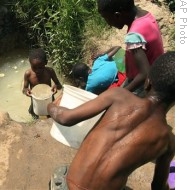-
(单词翻译:双击或拖选)
U.N. and other aid agencies have been working to contain the spread of the cholera outbreak since well before the government declared a national emergency this week. U.N. officials said the situation could hardly be worse. The needs are huge and operations to make things better will be very costly5.
 |
| Children collect water from a well in Harare, Zimbabwe, 05 Dec 2008 |
United Nations figures put the number of suspected cholera deaths at more than 500 and the number of confirmed cases at more than 12,000. A Spokeswoman for the World Health Organization, Fadela Chaib, said those most at risk of getting ill and dying are women and children, people who are malnourished and have little access to good water and sanitation6.
"The health infrastructure7 in the country is very weak. And, people who are going to get treatment in health centers are likely not to get the treatment they need because of lack of health workers and lack of supplies and medicines," she said.
The World Health Organization notes the fatality8 rate of more than four percent is extremely high and remains9 a serious concern. The epidemic is affecting nine of Zimbabwe's 10 provinces. The capital city, Harari, is worst hit.
But, aid workers acknowledge little information is available about the course of the epidemic outside of the country's three largest cities. They worry that cholera may be more extensive than what is now known.
Spokeswoman for the U.N.'s Organization for the Coordination10 of Humanitarian11 Assistance, Elizabeth Byrs, said U.N. and private aid agencies are redoubling their efforts to combat this disease. But, she said they are hampered12 by shortages of practically everything.
She said the country lacks fuel. It has huge logistical problems. It lacks technical staff to treat people and volunteers to spread the hygiene13 message to the population. She said even the most basic supplies, such as dishes, cups and spoons are missing in hospitals and clinics.
The cost of combating this epidemic is likely to be huge. For example, the U.N. Children's Fund said the agency spent $5 million just last week to provide clean water to people.
UNICEF anticipates it will need a great deal more money to carry out its humanitarian operation. But it is concerned that it might not get the needed resources. It said so far it has received nothing in response to a $9 million appeal it recently launched for emergency activities in Zimbabwe.
 收听单词发音
收听单词发音
1
cholera

|
|
| n.霍乱 | |
参考例句: |
|
|
|
2
epidemic

|
|
| n.流行病;盛行;adj.流行性的,流传极广的 | |
参考例句: |
|
|
|
3
affected

|
|
| adj.不自然的,假装的 | |
参考例句: |
|
|
|
4
collapsed

|
|
| adj.倒塌的 | |
参考例句: |
|
|
|
5
costly

|
|
| adj.昂贵的,价值高的,豪华的 | |
参考例句: |
|
|
|
6
sanitation

|
|
| n.公共卫生,环境卫生,卫生设备 | |
参考例句: |
|
|
|
7
infrastructure

|
|
| n.下部构造,下部组织,基础结构,基础设施 | |
参考例句: |
|
|
|
8
fatality

|
|
| n.不幸,灾祸,天命 | |
参考例句: |
|
|
|
9
remains

|
|
| n.剩余物,残留物;遗体,遗迹 | |
参考例句: |
|
|
|
10
coordination

|
|
| n.协调,协作 | |
参考例句: |
|
|
|
11
humanitarian

|
|
| n.人道主义者,博爱者,基督凡人论者 | |
参考例句: |
|
|
|
12
hampered

|
|
| 妨碍,束缚,限制( hamper的过去式和过去分词 ) | |
参考例句: |
|
|
|
13
hygiene

|
|
| n.健康法,卫生学 (a.hygienic) | |
参考例句: |
|
|
|















